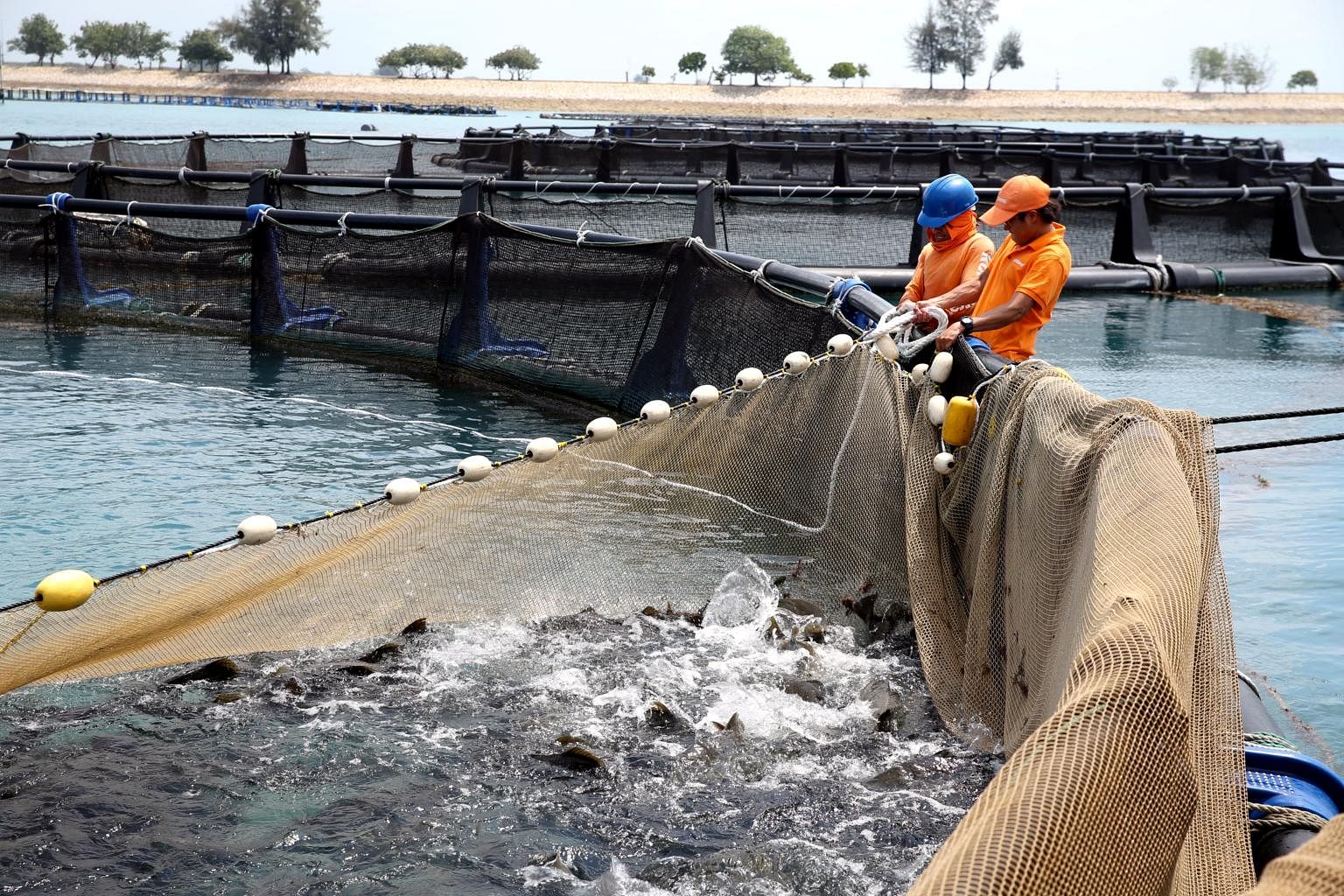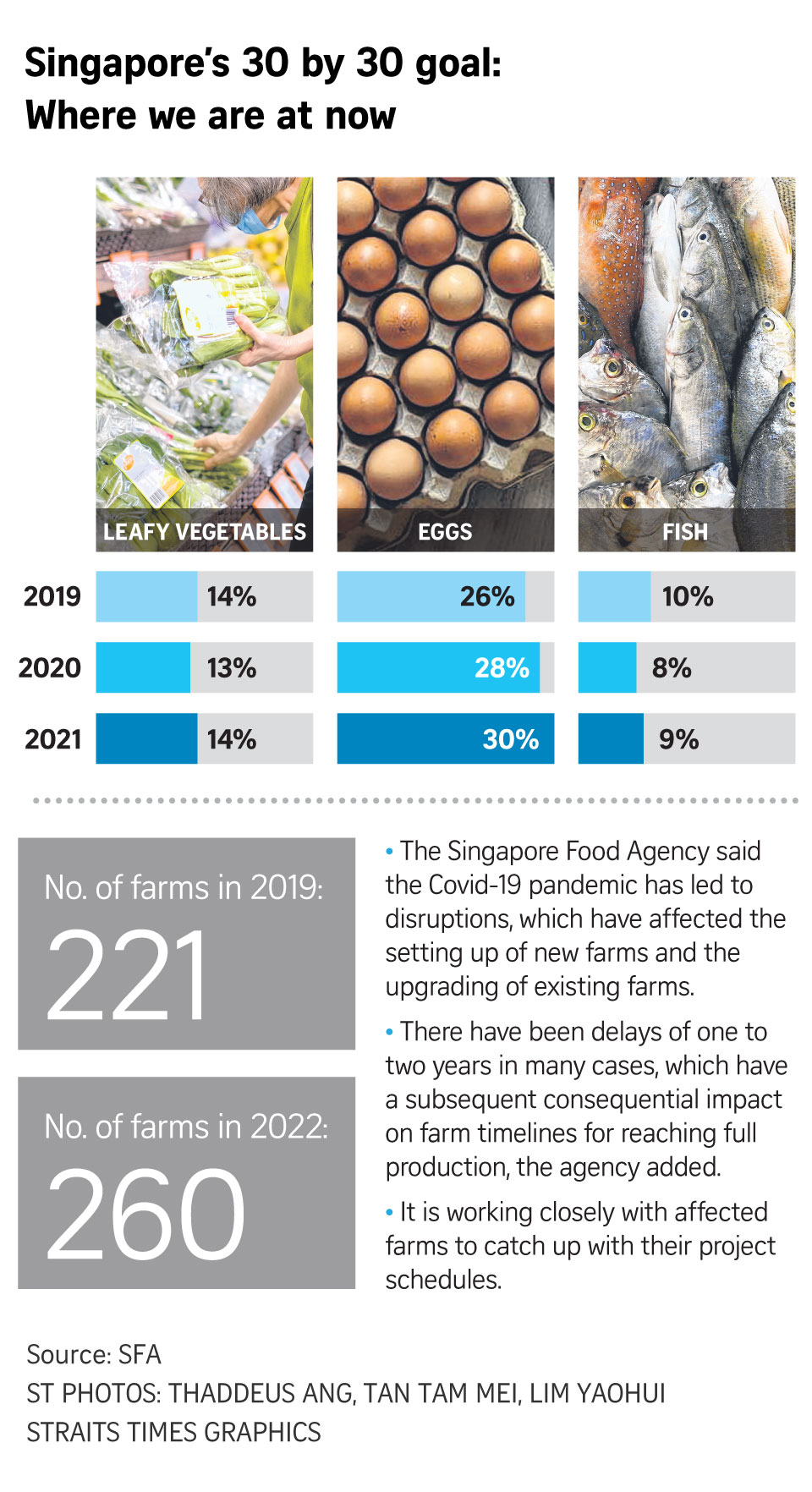Budget debate: Existing fish farms will have to pay for use of sea spaces
Sign up now: Get ST's newsletters delivered to your inbox

Currently, sea-based farms do not pay for the use of sea space. Farmers pay only for the yearly renewal of their fish culture farm licences.
PHOTO: ST FILE
Follow topic:
SINGAPORE - From next year, fish farms operating in Singapore's coastal waters will have to pay for the use of sea spaces, which are becoming increasingly sought after for various purposes such as for solar panel deployment or other maritime, industrial or recreational activities.
Currently, sea-based farms do not pay for the use of sea space. Farmers pay only for the yearly renewal of their fish culture farm licences, which is currently $850 per half-hectare per year.
This means that unlike land-based farms, coastal fish farms do not have leases that provide certainty on their use of sea spaces.
Minister of State for Sustainability and the Environment Desmond Tan said on Monday (March 7) during the debate on his ministry's budget that this lack of lease mechanism for sea-based farms is causing uncertainty for farmers.
This uncertainty can hinder farmers from making investments in high-technology farming solutions that could boost yields, as Singapore moves to increase local food production to secure food security.
"We will offer leases to all sea-based farms in the longer term," Mr Tan said.
Existing farms will be eased into this arrangement starting with yearly renewable temporary occupation licences from Jan 1 next year.
By then, the fish farm license fees will be reduced from the current $850 per half-hectare to $145.
New farm applications and farms with major changes to their farming activities will be subject to a one-off assessment fee, said the Singapore Food Agency (SFA). The Ministry of Sustainability and the Environment is the parent ministry of SFA.
The temporary occupation licence, which must also be renewed annually, will cost $3,600 per half-hectare in the Johor Strait - the narrow body of water to the north of Singapore where most of the Republic's 110 licensed fish farms are located.
In the southern waters, where the Barramundi Group now operates across two sites, the temporary occupation licence will be $6,000 per half-hectare.
SFA said the valuation of sea-based farms takes into account factors such as "locational attributes".
The Straits Times had earlier reported that an SFA-commissioned study had found that the Johor Strait is nearing carrying capacity, or maximum production levels. Production above the maximum levels could result in poorer water quality within the farming zones and impact productivity.
SFA said in a separate statement to ST that the temporary occupation licence for existing farmers will be renewed annually within a 10-year transition period, as long as the Government does not have plans for the space and farms meet the requirements of this license.
To mitigate this cost, however, the Government will adopt a phased approach to ease the farms towards a lease instrument, said the SFA.
"Farms will only start paying 20 per cent (of the temporary occupation licence fees) in 2024, 50 per cent in 2025, and 100 per cent from 2026," the spokesman added.
In Parliament on Monday, Mr Tan also said new land and sea parcels will benefit from longer-term leases of 20 plus 10 years.
"This means that future tenders will offer farmers the option of extending their lease beyond the initial 20-year period for an additional 10 years, subject to farms meeting SFA's production output conditions," he added.
This will apply to new land parcels in Sungei Tengah and Lim Chu Kang, as well as new sea space tenders that will be launched from the end of this year.
More details will be announced by SFA when the tenders are launched, Mr Tan added.
In 2019, Singapore set itself a target of meeting 30 per cent of the country's food needs locally by 2030.
To help it achieve this target, the Republic is broadening its focus beyond leafy vegetables, eggs and food fish to other food types, such as fruited crops like tomatoes, as well as mushrooms and shrimp.

Mr Tan said the Government will expand the scope of the Agri-food Cluster Transformation (ACT) Fund - which farmers can tap to deploy yield-improving innovations and technologies - to allow more food types that are commonly consumed in Singapore to benefit from higher co-funding.
From April 1, farms producing shrimp, mushrooms and fruited vegetables can tap a higher co-funding quantum of 70 per cent, or up to $6 million, under the ACT.
This is an increase from 50 per cent of the co-funding for those food types, when the $60 million ACT Fund was launched last year.
This means that the three food types will have similar co-funding caps as leafy vegetables, fish and eggs, which already had a 70 per cent co-funding since the ACT started.
The five-year ACT Fund comprises three co-funding components for local agri-food companies to transform their farming systems and increase productivity and yields. The three components are technology upscaling, innovation and test bedding, and capability upgrading.
New ACT Fund applications received from April 1 will be reviewed using the new co-funding criteria, said SFA.
There are currently 29 licensed crop farms here that can grow fruited vegetables such as cherry tomatoes. Among those, four of them are indoor or rooftop farms.
There are six mushroom and shrimp farms here, of which four are located indoors or on rooftops.
Mr Tan added that food supply resilience is crucial during this time as the pandemic and war in Ukraine is leading to volatility in food supply and prices globally.
"We can expect to feel the impact in the coming months," he said.
He encouraged the public to support and buy local produce.
"Without strong local demand, our farmers would find it hard to sustain a high level of production."

